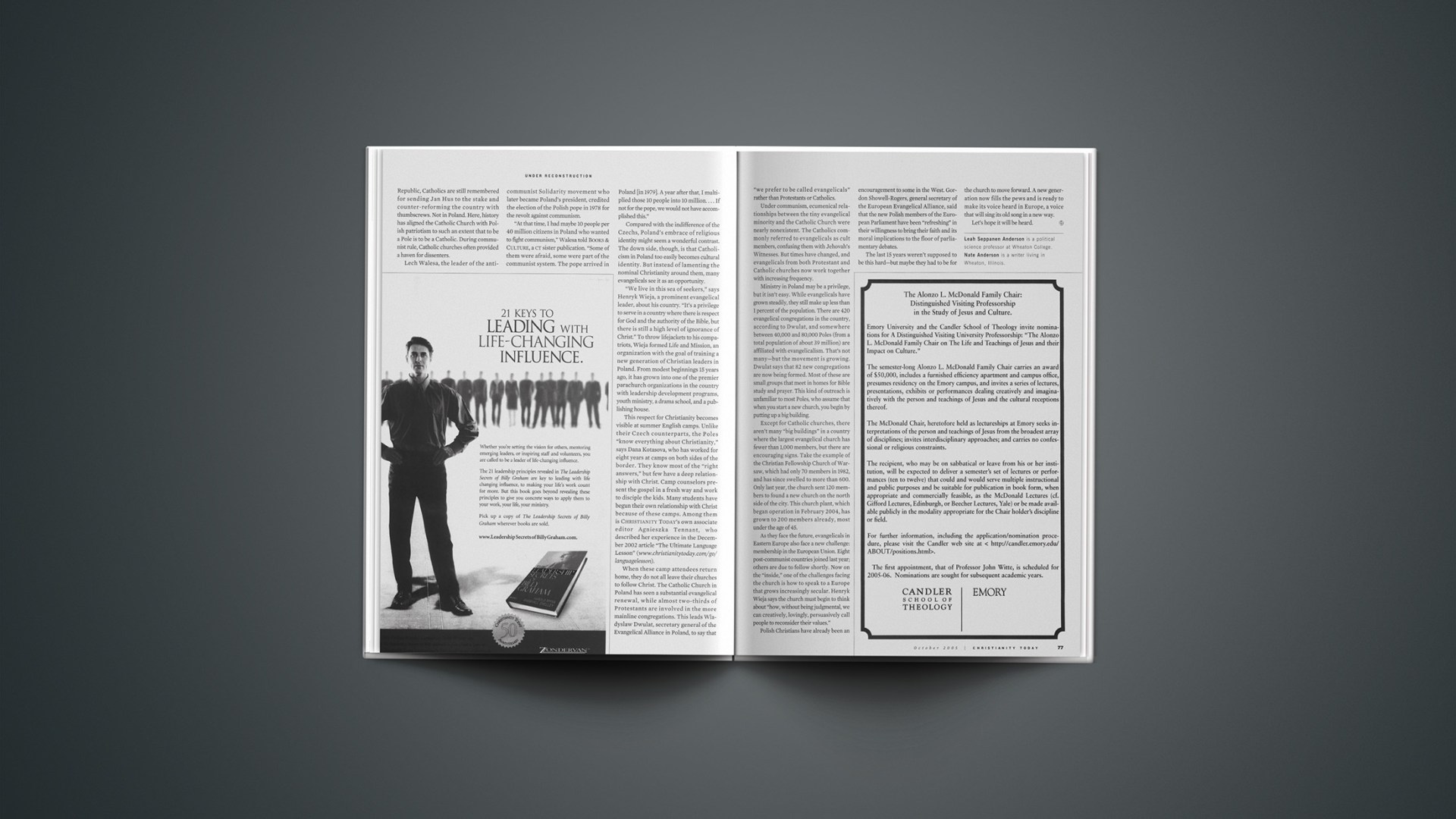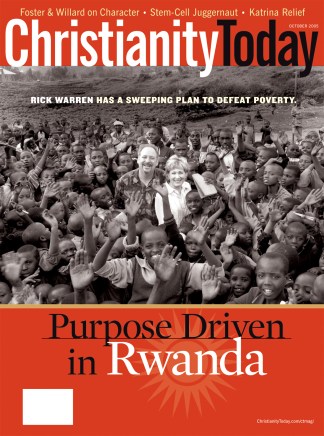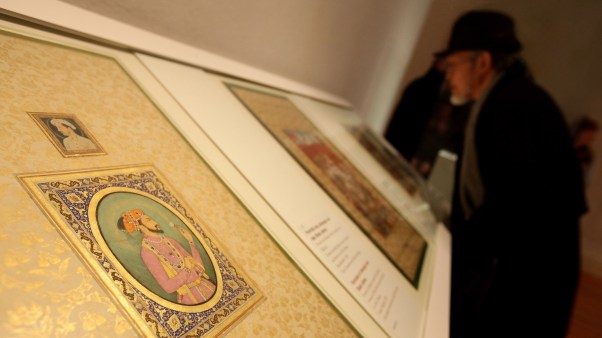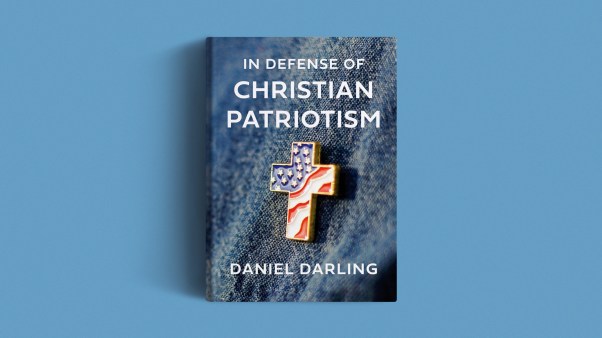It wasn't supposed to be this hard.
In November of 1989, half a million Czechs gathered in Prague's Wenceslas Square to shake their keys against a tired regime—and the regime collapsed. One month later, on December 29, the dissident playwright Václav Havel was elected president and inaugurated in Prague Castle.
His first act was a symbolic one: He crossed the castle courtyard and entered St. Vitus's Cathedral, where 90-year-old Cardinal Frantisek Tomasek celebrated Mass to thank God for "the great hope" of this new era. Then, as the most powerful politicians in the country sat in silence, the Czech Philharmonic began to play Antonin Dvorak's setting of the ancient hymn of praise to God, the Te Deum. The church could speak with a public voice once more.
When communism collapsed across Eastern Europe, the churches of Poland, East Germany, Czechoslovakia, Ukraine, Hungary, and Romania looked at such events with an optimistic eye. After four decades of withering repression, it seemed religious life could bloom again—and everyone expected that it would.
In those first years of freedom, evangelical Christianity seemed "Western" and intriguing because it had been so long forbidden. At the same time, every country had traditional churches—Reformed, Catholic, or Orthodox—that made Christianity seem patriotic.
This was the case especially in Poland. In 1989, opinion polls pegged confidence in the Catholic Church at 92 percent, and church attendance was also high. In 1994, the wave had crested and attendance fell for the first time. By the following year, the number of young men entering the priesthood had fallen by a third from its peak a decade earlier, and confidence in the church had dropped to 62 percent. Slowly, like with so many church buildings in Eastern Europe, cracks in the plaster became visible and began to spread.
James Krikava, a Lutheran missionary who has worked in the region for 15 years, calls the mid-'90s a time of leveling. "You saw a lot of these new people who came into the church leave the church again," he says. "Like the parable of the soils."
Why didn't they stay? Well, the church had a problem; or rather, many problems, varying by country. Most churches were rooted in national history, and they created disillusionment among those who came to see what the church could uniquely offer.
In the Czech Republic, one of the most secular nations on earth, the Catholic Church's attempt to reclaim more than 3,000 buildings and 225,000 hectares of property taken under communism made people deeply suspicious of the church's motives. In Ukraine, the influx of evangelical missionaries preaching a "personal relationship" with Jesus Christ caused great confusion among local Orthodox believers, to whom such vocabulary is foreign, and anger among Orthodox priests, who consider themselves Christians already. In Poland, the Catholic Church began to throw its weight around in politics—with some priests saying in sermons that it was a sin to vote for a non-Catholic presidential candidate.
And all of this says nothing of the great problem that hangs over every established church like a gray cloud: collaboration with the communists. The ruling parties did all they could to co-opt priests into serving as informants. Andrzej Grajewski, a Polish journalist, alleges in his book The Judas Complex that one out of ten priests in his country aided the secret police, and this perception is widespread elsewhere. Early this year, a Slovak government commission alleged that the Catholic archbishop of their country was a former secret police collaborator.
Finally, the double-edged sword of prosperity boosted living standards throughout the region, but also enabled consumerism to flourish. Christians could be easily distracted from ministry by the new economic opportunities, and the comforts of new wealth dampened people's interest in seeking God.
By 2000, it was clear that the church boom had failed to arrive as some expected. Religion journalist Jonathan Luxmoore, whose research we're using throughout this article, reported in the Religion, State, and Society journal that church attendance in the region saw a 15 percent drop during the last decade. Wladyslaw Dwulat, general secretary of the Evangelical Alliance in Poland, sums up the post-communist years this way: "It's not the growth we had prayed for."
It's a sobering story, but it's not the only one. Like the mustard seed of Jesus' parable, a small section of the church here is growing against the odds. While most established churches see only a steady decline, evangelical congregations have grown in every country in the region. This is all the more remarkable when you consider how different these countries are. We take a look at two: the Czech Republic, one of the most secular in the world, and Poland, one of the most religious. In both, evangelicals are the only group that, though small, is gaining members.
Where UFOs Top God
Common wisdom has it that the Czechs are a nation of atheists, with alcoholics outnumbering evangelicals and more believers in ufos than in God—and this isn't far from the truth. Census data from 1991 and 2001 show that in the decade after communism, the percentage of Czechs who identified as atheist surged from 40 to 60 percent, and a June 2005 Eurobarometer survey from the European Union shows that only 19 percent of Czechs believe in God.
Though priests of all denominations in the Czech Republic still get modest salaries from the government, their churches are increasingly empty. This is in part due to bad press from the most contentious property restitution process in the region. The issue has especially harmed the Roman Catholic Church, which lost a third of its members during the 1990s. Today it continues to press the government for a return of more fields, farms, cloisters, and hospitals, but the increasing perception in society is that the church is greedy.
Karel Taschner, director of the Evangelical Theological Seminary in Prague, says that when Czechs speak about the church, they say, "Ah, ah, we know. They want the property."
But decline is not inevitable. Small evangelical and Pentecostal denominations here have seen steady growth even as belief in God has plummeted. The biggest traditional Protestant church—the Protestant Church of the Czech Brethren—lost nearly half its members in the 1990s, but the Apostolic Church (Pentecostal) tripled its number in that same time, as did the evangelical Brethren Church. The renewal movements within Catholicism are growing as well.
According to the Czech Evangelical Alliance, in 2000 there were 545 evangelical congregations in the Czech Republic. The number of Czechs who claimed affiliation with an evangelical church in the 2001 census is 31,299, which means that an average of about 60 people attend each congregation. Though small, these churches have a sense of excitement about the future. Jiri Unger heads the Czech Evangelical Alliance, a group established at the encouragement of John Stott in 1991, and he calls it a privilege to serve in such an atheistic society. "You can influence so much," he says. "So many things are beginning."
Krikava, the Lutheran missionary, finished his 15 years of service in the country in June and has fully turned operations over to the congregations he helped to found. Looking back on his work in Prague and Plzen, Krikava radiates the same excitement. "At my church in Plzen, I think there's one adult who I didn't baptize," he says. "These are all people who came from atheism into the faith."
Though believers had hoped for greater results in the heady days of 1989, the low numbers have proven to be a strange kind of blessing. The church, so damaged by 40 years of communist oppression, had turned inward and was incapable of receiving an influx of new Christians.
"We were a ghetto that had to preserve Christianity," Unger says. "But we lost a vision for society, how to equip Christians outside the congregation or its meetings. A major goal is to enlarge the vision of the church, because the church is still suspicious of everything public."
Pavel Raus, who heads the pastoral care department at the Evangelical Theological Seminary in Prague, remembers well the reasons for this insularity. Because he had become a Christian in high school, he was not allowed to attend university but instead ended up at a technical college. There he became involved with a group of Navigators based in Vienna who came secretly to Prague to hold Bible studies and encourage Czech Christians.
Meeting foreigners without permission was not allowed, and Raus was once caught by the Czech secret police and interrogated about his activities. In such a climate, the church became inward looking, afraid of outsiders, and focused less on growth than on survival.
After communism collapsed, the upheavals in society produced great personal and political stress. This led to increased reports of depression, bipolar disorder, anxiety, marital problems, and burnout. But when people with problems came to local churches, the churches had almost no resources in place to deal with them.
The 1990s therefore became a decade of experimentation and development as the church expanded its mission and structures. One of the first lessons Christians learned was that Czechs are not open to being preached at—but they are open to relational evangelism, they love camps, and they want to speak English like a native. The result? A massive proliferation of English camps run by Christians.
Bradley Kaspar has helped run such a camp full-time for the last two years with the U.S. missionary organization Josiah Venture. "It's common for students to come to camp two or three years before they accept Christ as their Savior," he says. Many of them have never thought much about God or even know the Christian story, so it takes time both to teach and to build vital relationships. "In the end, solid arguments or convincing apologetics do some good, but the overwhelming factor that brings students to Christ is the love they say they see and experience at camp that they've never seen before."
Young believers now fill the pews of the evangelical churches. This new generation of Christians, the first to grow up without a memory of communism, wants to reach out to their peers in a fresh way, but sometimes this leads to conflict.
Rudolf Brancovsky is one of these young Christians, a 25-year-old painter and sculptor who moonlights as the lead singer and songwriter for the band Vesela Zubata (The Merry Grim Reaper). The group sings about faith and the church, and is often critical of the Christian subculture.
"Jesus changed water into wine; Christians tend to turn it back into water," Brancovsky says as we talk in his studio. His willingness to be up-front about the difficulties of the Christian life has given the band a strong secular following, but has made them less welcome in their own church. Brancovsky remembers how a pastor came into the church auditorium years ago and shut down his band's show because the acoustic punk music offended him. "We weren't able to speak our natural language in our church," Brancovsky says. "They wanted us to speak only in the language of these old structures."
Similar issues split several congregations back in the early 1990s, but most of the "hymns or choruses" debates have now died down. Much of the hard work has been done, and new resources and structures are in place. This summer's Setkani (Gathering) 2005, for instance, brought several thousand Christians from six countries together in Prague for fellowship and worship, and its main event was broadcast live on Czech television. Higher-quality Christian presses now publish more resources, the books ranging from Czech Bibles to Philip Yancey in translation. Support organizations, such as Pavel Raus's new counseling ministry, Parakletos, are now in place.
Not all the news about Czech society is bad: The same E.U. survey that pegged belief in God at 19 percent also shows a great spiritual hunger among the Czechs. Half the respondents said they believe in "some sort of spirit or life force." Disillusioned with traditional religious practice, many Czechs are open to a new way forward, and a new generation is finally ready to show it to them.
Polish Therefore Catholic
Just two hours by car north of Prague, one crosses a mountainous border and enters a different world. The June 2005 Eurobarometer survey shows that 80 percent of Poles believe in God and nearly a third attend Catholic services on a weekly basis. Major cities like Krakow have worshipers literally spilling out the doors of churches and onto the cobblestones for Saturday night Mass. And this is down from what the numbers used to be in the '80s and '90s.
Communism could never squelch the Catholic Church here. In the Czech Republic, Catholics are still remembered for sending Jan Hus to the stake and counter-reforming the country with thumbscrews. Not in Poland. Here, history has aligned the Catholic Church with Polish patriotism to such an extent that to be a Pole is to be a Catholic. During communist rule, Catholic churches often provided a haven for dissenters.
Lech Walesa, the leader of the anti-communist Solidarity movement who later became Poland's president, credited the election of the Polish pope in 1978 for the revolt against communism.
"At that time, I had maybe 10 people per 40 million citizens in Poland who wanted to fight communism," Walesa told Books & Culture, a CT sister publication. "Some of them were afraid, some were part of the communist system. The pope arrived in Poland [in 1979]. A year after that, I multiplied those 10 people into 10 million. … If not for the pope, we would not have accomplished this."
Compared with the indifference of the Czechs, Poland's embrace of religious identity might seem a wonderful contrast. The down side, though, is that Catholicism in Poland too easily becomes cultural identity. But instead of lamenting the nominal Christianity around them, many evangelicals see it as an opportunity.
"We live in this sea of seekers," says Henryk Wieja, a prominent evangelical leader, about his country. "It's a privilege to serve in a country where there is respect for God and the authority of the Bible, but there is still a high level of ignorance of Christ." To throw lifejackets to his compatriots, Wieja formed Life and Mission, an organization with the goal of training a new generation of Christian leaders in Poland. From modest beginnings 15 years ago, it has grown into one of the premier parachurch organizations in the country with leadership development programs, youth ministry, a drama school, and a publishing house.
This respect for Christianity becomes visible at summer English camps. Unlike their Czech counterparts, the Poles "know everything about Christianity," says Dana Kotasova, who has worked for eight years at camps on both sides of the border. They know most of the "right answers," but few have a deep relationship with Christ. Camp counselors present the gospel in a fresh way and work to disciple the kids. Many students have begun their own relationship with Christ because of these camps. Among them is Christianity Today's own associate editor Agnieszka Tennant, who described her experience in the December 2002 article "The Ultimate Language Lesson".
When these camp attendees return home, they do not all leave their churches to follow Christ. The Catholic Church in Poland has seen a substantial evangelical renewal, while almost two-thirds of Protestants are involved in the more mainline congregations. This leads Wladyslaw Dwulat, secretary general of the Evangelical Alliance in Poland, to say that "we prefer to be called evangelicals" rather than Protestants or Catholics.
Under communism, ecumenical relationships between the tiny evangelical minority and the Catholic Church were nearly nonexistent. The Catholics commonly referred to evangelicals as cult members, confusing them with Jehovah's Witnesses. But times have changed, and evangelicals from both Protestant and Catholic churches now work together with increasing frequency.
Ministry in Poland may be a privilege, but it isn't easy. While evangelicals have grown steadily, they still make up less than 1 percent of the population. There are 420 evangelical congregations in the country, according to Dwulat, and somewhere between 40,000 and 80,000 Poles (from a total population of about 39 million) are affiliated with evangelicalism. That's not many—but the movement is growing. Dwulat says that 82 new congregations are now being formed. Most of these are small groups that meet in homes for Bible study and prayer. This kind of outreach is unfamiliar to most Poles, who assume that when you start a new church, you begin by putting up a big building.
Except for Catholic churches, there aren't many "big buildings" in a country where the largest evangelical church has fewer than 1,000 members, but there are encouraging signs. Take the example of the Christian Fellowship Church of Warsaw, which had only 70 members in 1982, and has since swelled to more than 600. Only last year, the church sent 120 members to found a new church on the north side of the city. This church plant, which began operation in February 2004, has grown to 200 members already, most under the age of 45.
As they face the future, evangelicals in Eastern Europe also face a new challenge: membership in the European Union. Eight post-communist countries joined last year; others are due to follow shortly. Now on the "inside," one of the challenges facing the church is how to speak to a Europe that grows increasingly secular. Henryk Wieja says the church must begin to think about "how, without being judgmental, we can creatively, lovingly, persuasively call people to reconsider their values."
Polish Christians have already been an encouragement to some in the West. Gordon Showell-Rogers, general secretary of the European Evangelical Alliance, said that the new Polish members of the European Parliament have been "refreshing" in their willingness to bring their faith and its moral implications to the floor of parliamentary debates.
The last 15 years weren't supposed to be this hard—but maybe they had to be for the church to move forward. A new generation now fills the pews and is ready to make its voice heard in Europe, a voice that will sing its old song in a new way.
Let's hope it will be heard.
Leah Seppanen Anderson is a political science professor at Wheaton College. Nate Anderson is a writer living in Wheaton, Illinois.
Copyright © 2005 Christianity Today. Click for reprint information.
Related Elsewhere:
Other CT articles on rising evangelicalism in Europe include:
Promoting and Uniting European Evangelicals | Swimming against the current makes the European Evangelical Alliance's liaison to the E.U. feel alive. (June 24, 2005)
The French Reconnection | Europe's most secular country rediscovers its Christian roots. (Feb. 5, 2005)
The Ultimate Language Lesson | Teaching English may well be the 21st century's most promising way to take the Good News to the world. (Dec. 6, 2002)
Articles from Books & Culture's issue on God is not dead:
The Real Story of Secularization | Is Europe a special case? (November/December 2002)
God Is Not Dead | The April 8, 1966, issue of Time magazine (scheduled to coincide with Easter) created a hubbub with the stark cover line, "Is God Dead?" (November/December 2002)
The Renaissance of Religion in Canada | They're not dropping out. They're dropping in. (November/December 2002)
American Gnostic | Harold Bloom's post-Christian nation ten years on (November/December 2002)
More articles on faith and secularism include:
That Other Church | Let's face it: Secularism is a religion. Let's treat it as such. (Dec. 21, 2004)
Misfires in the Tolerance Wars | Separating church and state now means separating belief and action. (Feb. 24, 2004)
One Nation Under Secularism | France's peculiar aversion to public religiosity is rooted in a sordid history of sectarian violence. (Feb. 13, 2004)
God's Funeral | What will keep faith from nearly disappearing in America? (By Philip Yancey, Sept. 03, 2002)
The Wages of Secularism | New laws won't prevent another Enron. (June 04, 2002)
Zarathustra Shrugged | What apologetics should look like in a skeptical age. (Sept. 5, 2001)










